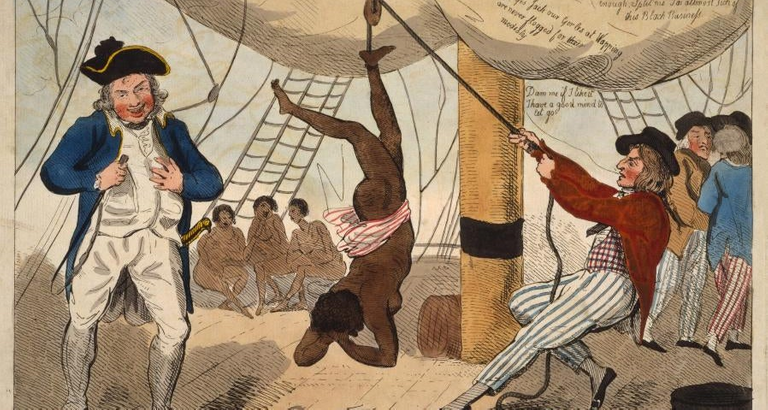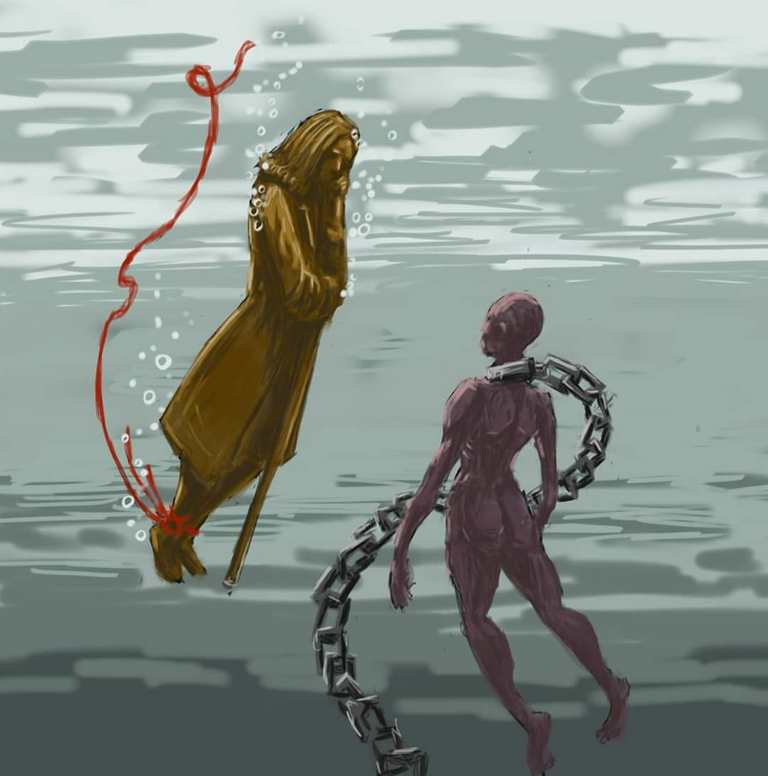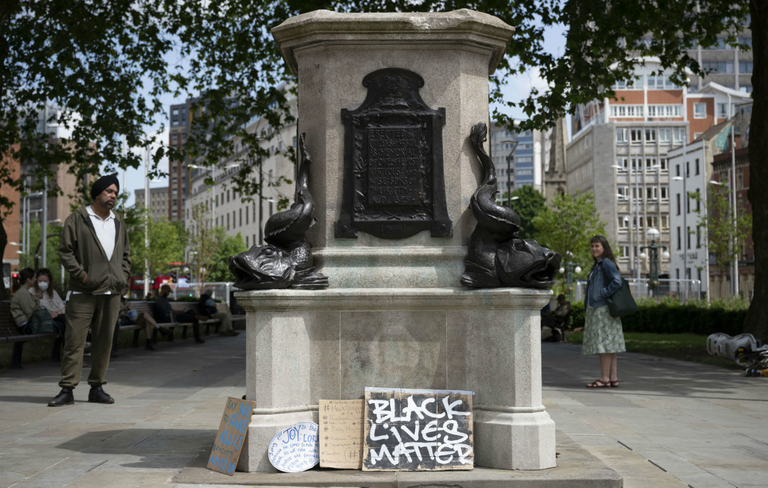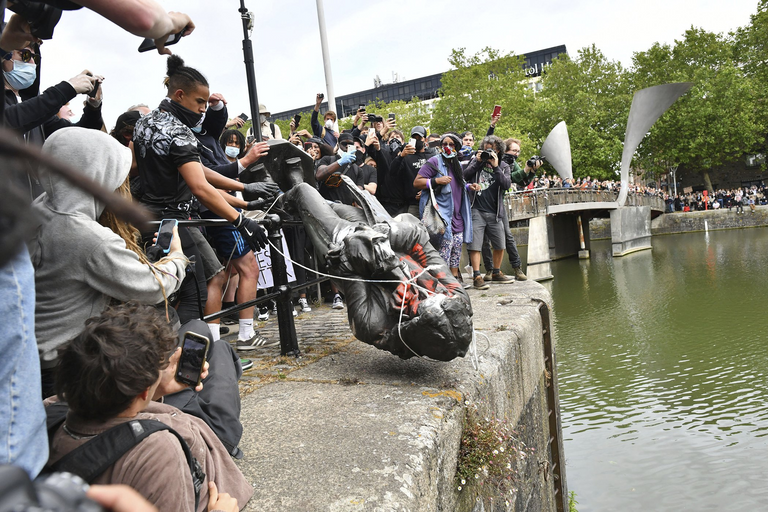In 2015, Britain's taxpayers finally paid the debt that was the compensation given to slave traders after abolition. Awarded with billions by today's inflation rates, they must have done alright for themselves. In fact, they did so well for themselves that some were even given statues to commemorate their contributions to society. And the slaves? You already know the answer - there was no compensation for them.

Britain can owe much of it's wealth to the slave trade. Should we ignore this history and instead celebrate it's achievements instead? Image Source
Edward Colston was one of them. The plaque on his statue in Bristol described him as 'virtuous' and 'wise'. He is described as a 'merchant' and 'philanthropist', disguising the fact he was a slave trader, who, as an offical for the Royal African Company, was involved in the enslavement of 84,000 Africans. Nearly 20,000 of these died as they were trafficked across the Atlantic. But you can erase a history like that if you donate money for schools and paternalistically give money to the poor. It suits a history that people want to remember, a vision of Bristol that Bristolians of the time wanted to see rather than the facts. It's a political action that must be understood as having a place in a long line of political actions that mirrors how the city - and how any city - wants to see itself.
This history is speaking quite loudly that the upholding of any symbols which hint at narratives of oppression can no longer be tolerated.
Sure, we can read about them and we can see evidence of them in museums. We should not sweep these dark moments under our dirty carpets, and no one is suggesting we do.
But the act of pulling down the statue, leaning on it's neck and dragging it to the channel to be sunk was not 'disgusting' and 'vandalism' as Britain's home secretary, Priva Pratel, would have us believe. Boris Johnston called it 'thuggery'. If this was thuggery, what was slave trading?
Such 'thuggery' is a reminder that nations have violently and brutally dominated with one body - white, male - at the expense of other bodies - black, female, poor, Jewish, LGBTQI. It is a reminder that white privilege cannot hold, and that it too must be dismantled and dissembled, kicked and drowned, beaten and hung, so that it no longer stand in the centre of the town squares of our nation states.
One of my yoga teachers has been very vocally arguing that acts of violence such as this - rioting, the tearing down of statues - is justified, even if it seems that 'ahimsa' (very basically, cause no harm or non violence) is the morally better path to take.
Where has non violence got 'us' she asks, as a person of colour? Where has petitioning, public speaking, letter writing, debate, or peaceable protest got the people who have been subject to the brutality of the past? Those that begged for the statue to be removed were not listened to. Sometimes acting in 'unlawful' ways is the only choice people have to change history. Sometimes it's necessary to set fire to cities to have better things emerge from the ashes.

"The Reunion" is by Caliban Isrisen
Sometimes 'ahimsa' can be read as the act which creates the least harm.
Acts like these can be justified, especially as it raises dialogue about how we heal from the past.
We heal by tearing down all the walls of the institutions that have committed acts of violence against the other. We heal by talking about the dismantling as it begins, not waiting for 'legal channels' or 'proper paths' to restorative justice. We heal by taking a stand, by showing courage, by calling out the names of those who have died so that another history takes the place where the statues of the people responsible once stood.

What remains can be a far more beautiful monument. Image Source

I literally wrote an entire chapter of my university thesis on how some destroyed monuments impact upon their viewers that the original monument! This is outside of the standard act of iconoclastic destruction of the "icons" of your enemies - which is arguably what this contemporary civil unrest amounts to.
Mine was along the lines of a funerary monument at Standford University. It was a copy of a monument in a grave elsewhere. Then the LA Earthquakes damaged and destroyed that statue - leading it to have even more emotional impact than the original sculpture.
Original:
Destroyed version:
And, if you need some reading... the thesis chapter adapted into a blog post, which I posted two years ago.
That's an incredible subject. I think that works with this too, in the aftermath of Colston:
That image is particularly stirring, as the angel despairs.
People talked about melting the statue down of Colston and reforming it into something more positive, but I think it's going in the museum along with all the placards for it's own exhibit. There is real art and poetry in this dissembling, that's for sure!
Truly powerful stuff! The geometry of the statue piece on its side, the signs, the sunshine beating done. Sometimes that "picture worth a thousand words thing" is really not enough.
By definition pulling down statues can't be thuggery as thuggery involves violence which in turn is an act against a living being. Statues aren't living, thus the act isn't thuggery.
I don't think there was any intent to harm anyone during those protests, just to destroy symbols of bygone eras that do harm people psychically.
Looked at like that - it's a non-violent collective act that actively removes daily psychic violence - people should be justifying why they are not actively trying to remove those statues not having to justify whey they were.
I agree with this whole heartedly! There's a lot of my friends on Facebook arguing that it's the destruction of democratic processes. But that makes little sense - how has democracy served the people who have been subjugated under it? Thus, why should they obey it? And if people are suffering under said political systems, why should the people not rise up and speak with such acts?
It's like what Thoreau said to Emerson when he visited him in jail for not paying his taxes.
One of my favourite little exchanges!
The problem here lies not within a person or groups that believe tearing down statues is A non violent act but the fact that they are offended by history, whether it be offensive or not, it is history. They care not about learning from history but erasing it.
Here in the States, It was the Democrat party that stood for and slavery, yet they tear down statues that are from confederate soldiers and such, but are loyal to the Democrat party. Make sense??
It’s because they have been dumbed down to “react” to and realize the history of it, because they weren’t taught it.
Also, it’s not the tearing down of statues, it’s the violent route they take when they take matters into their own hands, destroy not only statues but businesses, people’s lives, they have beaten and murdered people here in the states, in the name of one man they have beaten and murdered many more, yet people say it’s peaceful, and non violent...
I can't speak for America, and would certainly baulk at the beatings and murder, but that has a different context and complications I think, from what I understand.
When you say 'it's history', the thing is, it both 'is' and 'isn't' at same time. It's living in the bodies of the people who experience racism and are downtrodden under the political systems which were built on the backs of their suffering. The statues represent what the culture or society wants itself to be, and to be seen as. So if you've got a memorial to some figure who did this or that BUT the memorial doesn't mention what atrocities that person committed to 'achieve' the fame they were immortalised for, then it's not true history anyway - it's sheer propaganda.
I can understand you might be upset about the tearing down of businesses and lives, for sure. But statues? Tear them all fucking down.
DEFINITELY we collectively heal by giving a voice to the unheard and the oppressed - even if it is decades or centuries too late. A really lovely - and important! post.
Sharing to my FB feed as well, especially for my black friend Marc, with whom I discussed this very issue yesterday.
here.Curated for #naturalmedicine (by @artemislives) - join our community
We encourage content about health & wellness - body, mind, soul and earth. We are an inclusive community with two basic rules: Proof of Heart (kindness prevails) & Proof of Brain (original content). Read more here.
Our website also rewards with its own Lotus token & we'd love you to join our community in Discordhere. Delegate to @naturalmedicine & be supported with upvotes, reblog, tips, writing inspiration challenges for a chance to win HIVE and more. Click to join the #naturalmedicine curation trail!
Thankyou! I'm glad you appreciated it. I was infuriated with this image shared on Facebook yesterday which entirely missed the point.
Propaganda. Grr. I went for it - I probably should keep mouth shut and scroll past but the ludicrocity of this was like 'all lives matter'.
How would you rate the pulling down of Saddam statue?....i think that is one I saw in my life and feel it was done to abolish some of the worst atrocities and fear in people mind or US did it intentionally to show there superamacy?.
Just what I was going to say! Though for me the first thing that came to my mind were Soviet era statues all over Eastern Europe, but I guess for modern day Americans it's Saddam Hussein, whose statue they watched being pulled down over and over again.
Which makes me think - why bother keeping statues? Put them up, pull them down, whatever - they simply represent history at the time, which is fluid and dynamic.
Kinda like graffiti - not made to last, and can be rewritten over.
Each culture writes it's own story and memorialises the people that they believe represent it's values. If we would like to be seen as a society that promotes freedom and equality for all, a slave trader or a dictator aint it.
Saddam's a different story somewhat - America stepping in with it's morality uber alles is a very different argument imo.
True, however people are also complex phenomena. Someone may have been a great statesman, who at the same time was also involved in human traficking. Or another one could have been an amazing poet, but one who squandered his family's wealth, forcing his children to live in squalor. Is one who saved thousands from genocide still as admirable, if he made millions profiting off of them?
Thinking about it, I could not name one person I'd endorse to raised a statue of, no matter what wonderful things they've done, simply because there is a good chance they had some shady side I might not even know about. However, you can raise a statue to commemorate an event, a cause, a movement, etc. without highlighting any one flawed human being.
That's true. Humans aRE complex, but we reduce them to symbols. You're right - even a person as universal rather than a flawed person might help? Idk. it's all getting ridiculous. In the UK they poured bleach over a black statue.
Okay, I'm not sure I'm getting the idea of a universal person. Do you mean something like Buddha or Jesus... or even Gandhi, where the image has gotten completely removed from the actual person who once lived?
Did they pour bleach over a statue of a black person? Or was it the statue of a white person carved out of black material? What did the bleach do, eat up the statue, or just clean it real well?
Sorry for not getting the obvious. I kinda feel like I still need to get my brain working this morning.
Yeah, that's the first thing 'victors' or invader will do - pull down other people's monuments, churches, buildings. Probably a bit of both in that case - supremacy AND dismantling terror.
It should have been done peacefully, like the Fall of the Berlin Wall. It could have been a great moment of rejoicing and unifying the people.
Instead, it raises serious questions about the extent of further vandalism that may continue as a result of George Floyd's death. Is this what George would have wanted?
Actions of protest vandalism also divides some of us further into two groups: those who feel justified to use lawless means for immediate justice for a virtuous cause vs. those who prefer peaceful, lawful decisions to be made democratically even if it means justice is delayed slower by their own democratic bureaucracy.
No manner of action can ever justify George Floyd's death. Same goes for any person who had their life taken from them. Nothing can ever be done to repay a person who had their life taken away. (Whether or not the deceased's family deserves reparations for the wicked permanent removal of a valuable member of the family is a separate matter of greater debate. I believes our law system does allow for family to sue for damages in a way society generally approves of. Of course it is unfortunate, there is no possible justice system to repay for the genocidal destruction of entire family lines.)
We have to honor those who died by preserving them in our memories, words, our stories, and deeds. A gravestone, memorial, or a statue is often the preferred manner for family members to choose to commemorate their honor to a loved one. Heroes often have great monuments constructed by the many people who wish to honor them.
We can only hope that one day future generations might not fully forget their deeds. People in the past always hope the people in the future will ask, "What did this person do that these people felt it deserved to be honored with this symbolic marker?" When they can no longer determine any good reason for the landmark to remain, then they can decide to peacefully, remove it. The cycle of renewal begins again. Hopefully the lessons of the past are not forgotten, but learned from.
I agree to some extent, but in the case of this statue in particular, the memorial actually hid the atrocity of his involvement with the slave trade, and did not mark this fact. People had tried for a long time to get it changed, to no avail. Thus, in this case I believe the people should speak with their actions, and this hugely symbolic action raised important discussions about black history.
Not really. They put up monuments to affirm the society they wish to have - in this case, one of prosperity and philanthropy. Capitalism, if you will, made on back of slave trade. And that history is pretty much hidden, at expense of those who are subjugated and oppressed and subject to racism.
It's actually irrelevant what George would have said. We'd never know. Perhaps he wouldn't give two shits. Perhaps he'd be dismantling statues with the best of them.
We've waited for decades, hundreds of years for fairer treatment of people - through 'democratic processes'. I'm not sure democracy works in this case.
Thanks for your view and the comment, very thoughtful x
Thank you for the kind return exchange. Understanding begins with communication.
Absolutely xxxx
Great post! I just posted a comment on Instagram today, about 'all statues should be taken down' - it's something I've believed strongly for many years: in its most basic form as a symbol of patriarchy, it is so very outdated and inappropriate, before we get into the hierarchy's incredibly selective view of 'history'. I LOVE seeing our changing values resulting in collective decisions about what we allow to be put/ stay on pedestals in our cities: hugely symbolic and meaningful.
It is, it's so powerful, and the statue assembly/dissembly is a powerful motif too.
I don’t see this helping , the fact that people resort to these kinds of actions is beneath what we should want to have. I do oppose any discrimination , harmful , wrong or repression there is in the world
It makes me remember when Chavez got to power on Venezuela and his discourse made people tear the statues of Christopher Columbus down.
What I do think is that violence is the tool of the oppressors, and they will always find a way to use it in their favor and spin the facts to their convenience.
"Anger leads to the dark side" they say in Star Wars.
They do say that, but also the funny thing about anger is that it's also a human emotion. We're just not taught to deal with it or recognise it, so it is channelled badly. Especially woman - anger often causes shame, as we have no legitimate outlet for it. People also tell us we 'shouldn't' express anger - so what do we do with those feelings of frustration, injustice, rage?
The times are a'changing.. again. Change never comes without so-called "violence". Those in power rarely support causes of change because they are only concerned with their own status. Statues can be rebuilt if the public deems so, lives can not be replaced. The slavery trade was a horrible part of history and I'm impressed that protestors in England are trying to show the truth. We've been taught lies in history class and now many people are starting to check out what really happened. The truth can bring us together.
I hope so. I'm heartened to see so much posting of indigenous history in Australia on my facebook post. The centre cannot hold. I bloody hope so. Chaos can birth a new world.
Absolutely. Change is rarely given without demanding it. Governments fear change because politicians fear being cast aside themselves and generally only care about their own personal gains. Toppling of certain statues from the past can give birth to a new chapter in history and shed light on the reality of the past. Down with racism and the glorification of such people that committed such horrible acts and up with universal human rights and understanding that we all bleed red... One love.